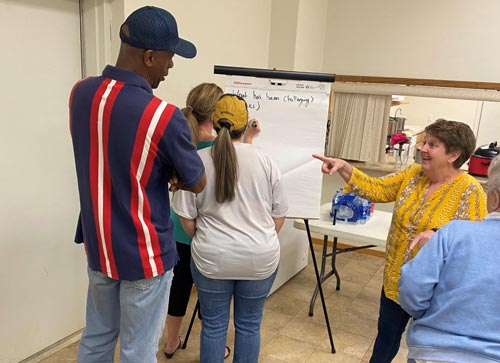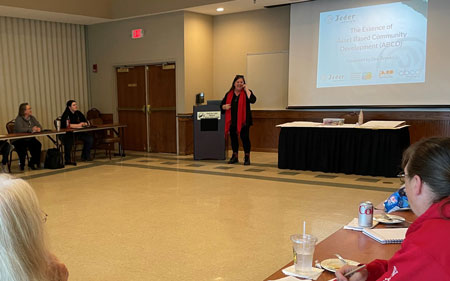Asset Based Community Development (ABCD)
What is it?
 Based in the work of John McKnight and John Kretzmann, Asset Based Community Development
(ABCD) is a strategy for sustainable community driven development. Beyond the mobilization
of a particular community, ABCD is concerned with how to link micro-assets to the
macro-environment.
Based in the work of John McKnight and John Kretzmann, Asset Based Community Development
(ABCD) is a strategy for sustainable community driven development. Beyond the mobilization
of a particular community, ABCD is concerned with how to link micro-assets to the
macro-environment.
What are the benefits?
Communities can drive the development process themselves by identifying and mobilizing existing, but often unrecognized, assets, and thereby responding to and creating local economic opportunity. ABCD builds on the assets that are already found in the community and mobilizes individuals, associations, and institutions to come together to build on their assets-- not concentrate on their needs.
An extensive period is spent in identifying the assets of individuals, associations, and then institutions before they are mobilized to work together to build on the identified assets of all involved. Then the identified assets from an individual are matched with people or groups who have an interest or need in that asset. The key is to begin to use what is already in the community.
What are some examples of ABCD?
Extension Health Ambassadors
 In the state of Arkansas, 55 of the 75 counties are considered rural by the USDA.
It is widely known that rural populations face disproportionate health challenges.
In the state of Arkansas, 55 of the 75 counties are considered rural by the USDA.
It is widely known that rural populations face disproportionate health challenges.
There are many contributing factors, including:
- lack of access to healthy foods or fitness facilities
- lack of access to telemedicine due to poor or nonexistent internet access
- lack of access to medical providers
With the Rural Health and Safety grant from the USDA, the community, workforce, and economic development team partnered with the health team from Cooperative Extension Family and Consumer Science Department to design and implement the Extension Rural Health Ambassadors program. By recruiting volunteer ambassadors to teach Extension health programming to their respective communities, access to and availability of Extension health programming will be increased, and more people can be reached with the end goal of improving their personal health.
Six rural Arkansas counties were chosen to participate:
- Clark
- Hempstead
- Hot Spring
- Mississippi
- Phillips
- Pope
In late 2022 through 2023, agents in these six counties have used the Asset-Based Community Development community engagement model to recruit ambassadors to their counties, based in the ABCD viewpoint that all community members have beneficial assets and capacities and should have a seat at the table when determining the future development of their communities. Concurrently, the health team has developed health education training materials to equip the extension agents and their ambassadors with the skills to deliver public, community-based health programs.
The recruited ambassadors are currently participating in an eight-hour program “Using Asset-based Community Development in Rural Communities” series focusing on four main sessions: ABCD Principles and Practices, Teamwork with Gifts and Strengths at the Core, Shifting Power from Associations and Institutions, and Utilization of the ABCD Toolbox as an Ambassador, and will be delivering health programs beginning in early 2024.
Breakthrough Solutions
Breakthrough Solutions is an award-winning, next-generation strategic planning and development program of the University of Arkansas Cooperative Extension Service with partners in the public, private and non-profit sectors. This program is no longer active.
Interested in training or a consultation in ABCD?
Contact Dr. Hunter Goodman, hgoodman@uada.edu, or Tabatha Duvall at tduvall@uada.edu.
Related Links